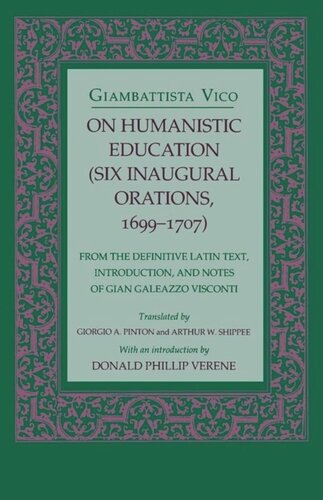

Most ebook files are in PDF format, so you can easily read them using various software such as Foxit Reader or directly on the Google Chrome browser.
Some ebook files are released by publishers in other formats such as .awz, .mobi, .epub, .fb2, etc. You may need to install specific software to read these formats on mobile/PC, such as Calibre.
Please read the tutorial at this link: https://ebookbell.com/faq
We offer FREE conversion to the popular formats you request; however, this may take some time. Therefore, right after payment, please email us, and we will try to provide the service as quickly as possible.
For some exceptional file formats or broken links (if any), please refrain from opening any disputes. Instead, email us first, and we will try to assist within a maximum of 6 hours.
EbookBell Team

4.1
50 reviewsVico's earliest extant scholarly works, the six orations on humanistic education, offer the first statement of ideas that Vico would continue to refine throughout his life. Delivered between 1699 and 1707 to usher in the new academic year at the University of Naples, the orations are brought together here for the first time in English in an authoritative translation based on Gian Galeazzo Visconti's 1982 Latin/Italian edition.
In the lectures, Vico draws liberally on the classical philosophical and legal traditions as he explores the relationship between the Greek dictum "Know thyself" and liberal education. As he sets forth the values and goals of a humanist curriculum, Vico reveals the beginnings of the anti-Cartesian position he will pursue in On the Study Methods of Our Time (1709). Also found in the orations are glimpses of Vico's later views on the theory of interpretation and on the nature of language, imagination, and human creativity, along with many themes that were to be fully developed in his magnum opus, the New Science (1744).
On Humanistic Education joins a number of translations of Vico's works available in paperback from Cornell—On the Study Methods of Our Time, On the Most Ancient Wisdom of the Italians, the New Science, and The Autobiography of Giambattista Vico. It will be welcomed by Vichians and their students, intellectual historians, and others in the fields of philosophy, literary theory, history and methods of education, classics, and rhetoric.